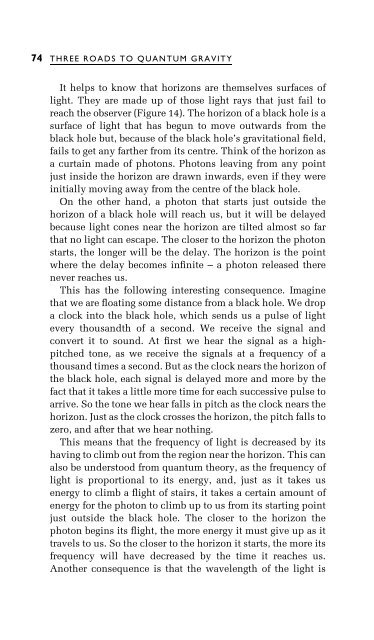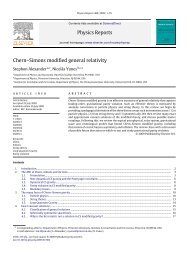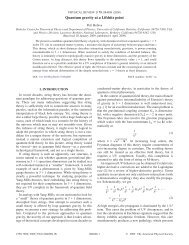Three Roads To Quantum Gravity
Three Roads To Quantum Gravity
Three Roads To Quantum Gravity
Create successful ePaper yourself
Turn your PDF publications into a flip-book with our unique Google optimized e-Paper software.
74 THREE ROADS TO QUANTUM GRAVITY<br />
It helps to know that horizons are themselves surfaces of<br />
light. They are made up of those light rays that just fail to<br />
reach the observer (Figure 14). The horizon of a black hole is a<br />
surface of light that has begun to move outwards from the<br />
black hole but, because of the black hole's gravitational ®eld,<br />
fails to get any farther from its centre. Think of the horizon as<br />
a curtain made of photons. Photons leaving from any point<br />
just inside the horizon are drawn inwards, even if they were<br />
initially moving away from the centre of the black hole.<br />
On the other hand, a photon that starts just outside the<br />
horizon of a black hole will reach us, but it will be delayed<br />
because light cones near the horizon are tilted almost so far<br />
that no light can escape. The closer to the horizon the photon<br />
starts, the longer will be the delay. The horizon is the point<br />
where the delay becomes in®nite ± a photon released there<br />
never reaches us.<br />
This has the following interesting consequence. Imagine<br />
that we are ¯oating some distance from a black hole. We drop<br />
a clock into the black hole, which sends us a pulse of light<br />
every thousandth of a second. We receive the signal and<br />
convert it to sound. At ®rst we hear the signal as a highpitched<br />
tone, as we receive the signals at a frequency of a<br />
thousand times a second. But as the clock nears the horizon of<br />
the black hole, each signal is delayed more and more by the<br />
fact that it takes a little more time for each successive pulse to<br />
arrive. So the tone we hear falls in pitch as the clock nears the<br />
horizon. Just as the clock crosses the horizon, the pitch falls to<br />
zero, and after that we hear nothing.<br />
This means that the frequency of light is decreased by its<br />
having to climb out from the region near the horizon. This can<br />
also be understood from quantum theory, as the frequency of<br />
light is proportional to its energy, and, just as it takes us<br />
energy to climb a ¯ight of stairs, it takes a certain amount of<br />
energy for the photon to climb up to us from its starting point<br />
just outside the black hole. The closer to the horizon the<br />
photon begins its ¯ight, the more energy it must give up as it<br />
travels to us. So the closer to the horizon it starts, the more its<br />
frequency will have decreased by the time it reaches us.<br />
Another consequence is that the wavelength of the light is



![arXiv:1001.0993v1 [hep-ph] 6 Jan 2010](https://img.yumpu.com/51282177/1/190x245/arxiv10010993v1-hep-ph-6-jan-2010.jpg?quality=85)


![arXiv:1008.3907v2 [astro-ph.CO] 1 Nov 2011](https://img.yumpu.com/48909562/1/190x245/arxiv10083907v2-astro-phco-1-nov-2011.jpg?quality=85)








![arXiv:1002.4928v1 [gr-qc] 26 Feb 2010](https://img.yumpu.com/41209516/1/190x245/arxiv10024928v1-gr-qc-26-feb-2010.jpg?quality=85)
![arXiv:1206.2653v1 [astro-ph.CO] 12 Jun 2012](https://img.yumpu.com/39510078/1/190x245/arxiv12062653v1-astro-phco-12-jun-2012.jpg?quality=85)
